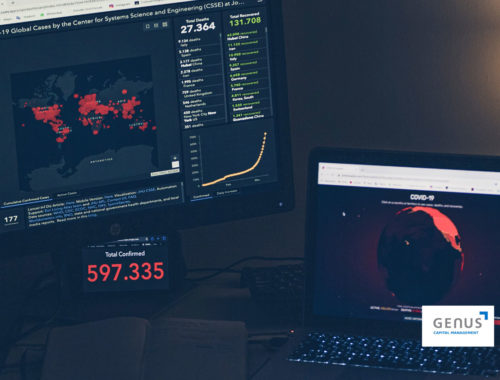As we go through these unprecedented times we want to ensure that we continue to provide you with up to date information. In these weekly segments our founders, Wayne Wachell and Leslie Cliff, will provide you with our insights on what’s going on around the globe.
Leslie Cliff: [00:00:01] Well, welcome, everybody, to our Friday video of the Genus Friday video, it’s me, the 8th is our eighth week doing this, and I’m hoping that pretty soon you guys will be too busy on a Friday night to to be looking at this. Hopefully, Dr Henry’s got us moving in the right direction. But we’re here today and this week, Wayne, I just think it’s been a fascinating week. One of the things I love working in this industry is it’s so interesting. So this week, the VIX, which we talked about last week. It is a measure of volatility and really risk, which peaked at 80 in the mid March, is went from 40 this week to close at twenty seven. So a ton of risk came out of the market this week and the market went up this week and went up back to twenty nine hundred. So where it bounced off the lows. So but there’s a lot of bad news out there. What’s going on
Wayne Wachell: [00:00:57] Well, number one, the stock market is an information discount machine. So it discounts information six to nine months in advance. So it’s looking at, it’s seen thinflection point in the economic side and the virus. And it’s moving on, number one. Number two, there’s been you know, there’s so much money printed. The money supply is up 25 percent year over year. The government is throwing away money. But in the end of the day we’re talking about six or seven. I can’t I forget count now they’re the trillions of dollars that you’re going to spend the next little while and people are starting to go back to work. We’re getting that inflection point. And, you know, we’re seeing people going back to work. And there’s, of our our teem members did today was look at who are the winners of this whole COVID-19 pandemic. Well, can you think of a better scenario for technology than what just happened? You can’t. It’s basically what we’re seeing an acceleration of technology here, at more speed go into place we were supposed to be probably five years from now. So big winners in technology. And yeah, health care. Were they a big winner? They were big winner. Oh, communications services, telecom. Everybody’s using Zoom, everyone is on the computer upgrading their their Internet speeds. Another winner, consumer staples. Were they a winner? Everybody’s buy bleach and storing things in their homes. So there were big winners. That was the thing that really got me in this whole discussion over, over the pandemic was was different, there were winners and then a big, big, big losers, obviously. And tragedy as well out there, no cover, no cover that up. But if you look at the winners, there are about 60 percent of the US stock market that have actually, if COVID stopped tomorrow, we started losing what would be a good environment for them. And if you start adding up, you know, where all the jobs were lost in hotels and restaurants and Carnival Cruises, that’s about five percent of the overall market cap of the US. So, if you stop, I’m listening here today, CNBC, and they’re kicking up the jams and how bad things are in the hotel and the market’s going up. And it’s because the market capitalization is very small for that segment. It’s a big impact. Now, there’s going to be some fallout from that, obviously, to impact the market. And that’s on the financial side. To me, that is the linchpin. That is a crucial part of the whole market. And we have to watch that. There are sectors doing very well. There’s a majority of the U.S. market. And in Canada, the story is not as good. In Canada, the sectors that are winning are about 20 percent of the overall market because we’re a resource based economy. And our banks are so big, our banks are still 30 percent of the overall market. So that’s doesn’t go well on a relative performance for Canada vs. the .US.
Leslie Cliff: [00:03:45] Right. So just they’ll bring clients up to date on their positioning. So we’re fully weighted in stocks. Whatever your benchmark is, you’re probably right on that. And that isn’t usually aggressive, given Wayne’s enthusiasm for it.
Wayne Wachell: [00:04:01] But there’s still things to be concerned about here. I’m trying to justify where we are today.
Leslie Cliff: [00:04:06] That’s fine.
Wayne Wachell: [00:04:06] So let’s not get, you know. Let’s not look at Main stream and the problems behind us or what the market is looking forward at and who are the winners in this space.
Leslie Cliff: [00:04:15] Right. And truly, nobody knows what’s going to happen. The analysts aren’t even giving guidance for what earnings will be next year on majority of stocks, the S&P 500. We don’t know if there’ll be food disruption. We don’t know so many things. So my point is, if the market does go down from here and we see lots of justification for why it is here, but if it does go down, we have cash in people’s portfolios to buy and we’ll be buyers. So just don’t want Wayne’s enthusiasm to make you think that we’re really aggressive. We’re just back to where your policies are. So thanks for that Wayne. That’s great. Now, my my second question is really a geopolitical question. It’s probably not a fair question, but I’m so curious about the answer and there isn’t really an answer. But anyways, it’s about China and the US and how they have for a couple of decades now, had this nervous but stable symbiotic relationship that helped both of them drive their economies. And really, this stopped maybe a year ago or two years ago when the tariffs came to light and the unfair trade practices came to light. Then while we kinda came to light and even Zoom server, the servers are in China. Clause of the Panther. Great book you got to read if you haven’t. And then, of course, the the flu virus starting in China. And was there a cover up or not? And the road across the world, blah, blah, blah. Anyways, the point is the cat’s out of the bag. The Communist Party in China is revealing itself to be much more aggressive than they’ve revealed themselves over the last couple of decades. So and the mood around the rest of the world is to wake up and the detention camps. So on, I missed that one. Anyways, what Wayne do you think is the outcome of the new reality? Because we can’t have a nuclear war, we all die. So how do they fight each other in a in a new Cold War? What does it mean for our investments?
Wayne Wachell: [00:06:19] Well, I think there will be a Cold War longer term. I don’t know how it’s going to shake out, but it could be just a major economic war. I think for number one, the developed countries have to develop there, have to diversify their supply chain, which is a big problem. We saw the problem with getting masks and everything else. Even even testing was it was an issue, you know, having to get supplies from from China. I think in the near term, I think they’re both going to play nice. I think Trump wants to get elected so he can’t bash China too much. He has to lay low. Also, we need supplies for our immediate PPP, PPEs from China right now. But I think longer term, the rest of world and the US, the rest of world are waking up in terms of what’s happened to, in terms of how, how their pandemic broke out of China. There was definitely cover up going on there in terms of getting it, letting people into investigate it. So it’s gonna be a long time, it’s going to be a Cold War. And I don’t want to break up military. But I think it would be probably up cover till election time. And we’ll see what happens from there. But I think, I think for good until election at this point time.
Leslie Cliff: [00:07:30] So, that would does not from an investment standpoint, does that again justify a higher weight outside of Canada, given our lack of industrial output, or does it?
Wayne Wachell: [00:07:41] It seems like it seems like, you know, with the pandemic, we’re getting back to regional sort of competition or regional basis for the economy and that there’s even talk of people leaving city, going to smaller cities and things like this. So it’s going to probably be a bit of a drag on global trade based on just projecting what’s happening with China. They’ll be maybe a U.S. sphere, which will be North America, Canada, Mexico. So we’ll be stuck more in that. Canada is going to try and play both Mexico and China as best it can here, but it’s going to have to change at one point time. And the U.S is the obvious choice given the proximity. In Europe, who knows what’s going to happen there? How about breakout? But it’s going to mean more regional, more broken up world, I think. And we’ve seen the people globalization. So it’s it’s going to be probably higher costs, longer term. But there’s technology coming. If robots are coming, there’s printing technology coming that, you know, might be these things aren’t your own home. So it’s it’s I think technology is eating more of it, a separate society and separate culture. And those are some of the things we should be talking about, too. Just in terms of this threat between the U.S and China, are the big cultural changes that are going to take place because of defense in terms of government spending? Will there be a push to more socialism? Know what’s going to happen with the equality of income example? So it’s going to have a cultural and economic and shifts and implications for a long term.
Leslie Cliff: [00:09:16] Yeah, you’re actually, wandering into my third and final question, which is again, so we had started before the virus, but the virus has accelerated and that is the wage gap and the wealth gap and how this is horrific for making that gap wider. I mean, there’s only so long these governments can pay for rent and food for all these unemployed. The unemployment this week in United States, 20 million people unemployed this week, 15 percent unemployment in the U.S. That’s a lot of people. And so the gap people, the stock market, they’re down five percent year to date. So, again, you’ve got winners and losers, not just companies, but people. And I know there’s not an answer. But I worry about the election than just social unrest.
Wayne Wachell: [00:10:08] Well, you know, they say we’re all just, you know, from twelve days of anarchy to this food supply gets cut off. And that’s why keeping the meat plants and everything else open is really important for the safety of society. And so, yes, there’s this is this could really spin out of control very easily. But the thing is, you know, looking forward, jobs will start coming back rather dramatically over the next quarter or two. They’re not going to all come back. I don’t think. I think it will probably sitting here, you probably were. I think our three point five and U.S pre pandemic will probably somewhere around seven or eight nearby in the new year next year sometime. And some of those jobs won’t come back and some of the hotel business or restaurant business. But you know what? Things are changing. We’re shifting. We’re seeing business. The creativity of entrepreneurs shift so dramatically through the course of this whole pandemic. And there’ll be new opportunities, I think, and an acceleration to digital economy. And so we just need more and more, more of that. And I think that’ll help keep us going longer term. It’s going just like warp speed into the digital economy, where we be five years you now.
Leslie Cliff: [00:11:13] Yeah, well, I think that’s enough for one week. I think the most important thing is that Sunday is Mother’s Day and it’s great, great reason to play a little guilt trip on your family to get into their bubble. Dr. Henry approves and I recommend that.And yeah,
Wayne Wachell: [00:11:33] Happy Mother’s Day to all the mothers out there.
Leslie Cliff: [00:11:35] Sorry Wayne?
Wayne Wachell: [00:11:36] Happy Mother’s Day to all the mothers out there.
Leslie Cliff: [00:11:39] Yes. Anyways, and we’ll see you next Friday. Call your portfolio managers with. Questions. Thank you.

Genus Weekly In Focus – Addressing COVID-19 Concerns Week-33
https://youtube.com/watch?v=QBo8xTWo_KM%3Frel%3D0 Watch Genus Weekly Video – Week 33 with Thomas Holloway and Justin Hahn. Despite positive economic news, markets fell with COVID and election uncertainties. GDP, employment and earnings are holding up due to the tech sector growth. This week’s questions: [00:23] : What happened

Genus Weekly In Focus – Addressing COVID-19 Concerns Week-31
https://youtube.com/watch?v=o9qqnJGBbnE%3Frel%3D0 Watch Genus Weekly Video – Week 31 with Mike Thiessen and Stephanie Tsui. Bank earnings were better than expected in a volatile week. Volatility is expected to continue until after the election. Green sector has long-term momentum, regardless of the election results. This week’s

Genus Weekly In Focus – Addressing COVID-19 Concerns Week-30
https://youtube.com/watch?v=yR1N3wmJSvI%3FREL%3D0 Watch Genus Weekly Video – Week 30 with Ian Lusher and Wayne Wachell. Trump’s positive response to the COVID treatment buoys the stock market. Biden leads the polls but will need the Senate’s help for material change. This week’s questions: [00:23] : First of











